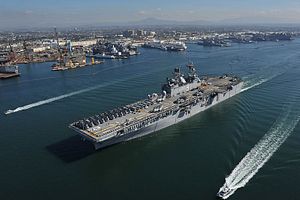Is America slouching toward offshore balancing? Maybe so, if columnist Lee Smith has it right. Writing over at Tablet, Smith claims that Harvard professor Stephen Walt is this generation’s George F. Kennan, a foreign-policy intellectual whose appraisal of the geopolitical landscape, and of the proper methods for managing it, captures the attention and allegiance of top policymakers.
Smith refers mainly to Walt’s commentary on Israel. To oversimplify, Walt maintains that the “Israel lobby” wields outsized influence in Washington. Such influence, quoth he, deforms U.S. foreign policy in favor of a small, beleaguered ally that contributes little to the alliance while ensnaring the United States in disputes remote from its interests. To make decisions that truly suit the national interest, then, officialdom should afford Israel no more deference than any other small Middle Eastern country.
But this is about more than Israel. Walt extrapolates his logic to all American allies under his doctrine of “offshore balancing.” Taken to extremes, international relations’ “realism” is all about big powers. Small fry mainly just get in the way. Though he doesn’t couch it in such Clausewitzian terms, Walt proclaims in effect that the United States attaches too much value to its overseas alliances. By exaggerating the value of alliances, it takes on efforts of magnitude and duration far disproportionate to its interests. In other words, it invests too heavily, and for too long, in arrangements that provide dubious returns.
By extending security guarantees to allies like Japan or Taiwan, moreover, America exposes itself to needless dangers — in particular, war with a rival great power. Better to retire offshore, abjuring overseas entanglements, than risk such a bloodletting. America should let Eurasian powers balance against would-be hegemons — meaning domineering powers like Iran or China — on their own, and only intervene directly if those regional powers cannot contain would-be hegemons on their own. And by doing so the U.S. could undertake sweeping defense cuts, safeguarding its most basic interests while aligning ends with means. Indeed, some offshore balancers say the United States could slash defense spending by half. In effect, it would try to balance against predatory great powers along the Eurasian rimlands from bases on American soil.
These are serious arguments made by serious people. They deserve to be aired thoroughly in policy circles. (The Naval Diplomat rejects the concept on practical grounds.) The danger is that rather than debate the merits of the strategy, decisionmakers could seize on offshore balancing as an easy way out of today’s budgetary dilemmas. Walt’s is a highfalutin’ theory, from a Harvard professor, that supplies a convenient excuse to cut military forces. It supplies intellectual top cover for officials loath to be seen as soft on defense.
Great Britain, it was said, acquired a peerless empire in a “fit of absence of mind.” The United States must not relinquish its own forward posture absentmindedly, dismantling the means on which that posture rests merely to balance the books. One imagines Kennan, the prophet of containing the Soviet Union from forward outposts, would agree.
So might Admiral J. C. Wylie. Wylie observes that the U.S. government commonly puts the cart before the horse in matters budgetary and strategic. In theory, policymakers work with strategists — the executors of policy — to design plans to accomplish national goals with the resources available. That’s the theory. In reality, Congress often makes strategic decisions through the dollars and cents it allots. By capping certain expenditures — on ships or aircraft, ammunition or spare parts, underway or flight hours — lawmakers may foreclose strategic, and thus foreign policy, options.
That’s why some of the navy-related news bubbling up from Washington is so worrisome. For example, Admiral Bill Gortney recently unveiled an “Optimized Fleet Response Plan” that will slow the operational tempo for navy carrier strike groups. Crews will doubtless welcome a more relaxed pace of life. But the new deployment plan does signal that U.S. naval power is more likely to surge from homeports in the United States than respond from overseas stations. Sounds rather offshore to me.
More troublingly, as the latest budgetary wrangling unfolds, arguments for reducing the U.S. Navy’s carrier fleet appear to be gaining steam among both lawmakers and analysts. Now, there may be good reason to scale back the number of flattops. For instance, the offense-defense balance may be skewing against surface fleets as technology boosts the range and lethality of land-based weaponry. To all appearances, though, the cuts being mulled over have little to do with modifying the composition of the fleet to meet new operational realities. It’s all about reducing the number of hulls in the water.
So there’s a weird dualism here. It seems the debate over America’s global posture is taking place way up in the airy-fairy realm of international relations theory, where ideas that may or not be actionable are bruited about, and down in the grubby realm where dollars and cents are king. That leaves a void in between, which operational and strategic thought needs to occupy. Let’s fill in that void — and stop slouching around.

































